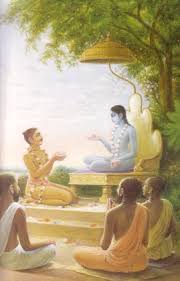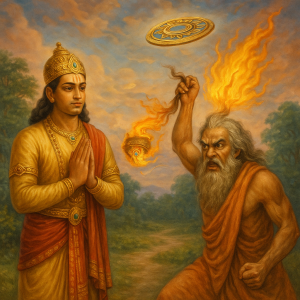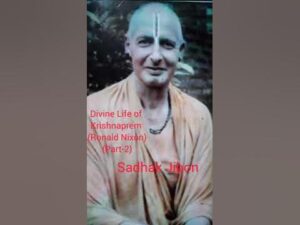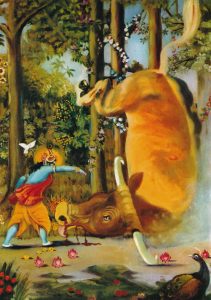The Curse and Acceptance by Parīkṣit
After a long and righteous reign, Mahārāja Parīkṣit, grandson of Arjuna and disciple of Lord Kṛṣṇa, once committed a small offense against a brāhmaṇa sage. He was fatigued and thirsty during a hunting trip and approached the āśrama of Śamīka Ṛṣi, who was in deep meditation.
Receiving no response, the king, in a moment of human weakness, placed a dead snake on the sage’s shoulders as a prank.
When Śṛṅgi, the sage’s young son, heard of this, he angrily cursed Parīkṣit to die in seven days, bitten by the serpent Takṣaka.
When the news reached Parīkṣit, he did not retaliate, but calmly accepted it as the Lord’s divine arrangement.
“If death is coming in seven days, then let me prepare by hearing about the Lord with full attention.”
The Assembly on the Banks of the Ganges
Parīkṣit renounced his kingdom, family, and comforts. He sat on the banks of the Ganges, where thousands of great sages, rṣis, yogīs, and brāhmaṇas gathered, desiring to witness this glorious event.
In this sacred moment, appeared Śukadeva Gosvāmī, the son of Vyāsadeva—a sixteen-year-old, radiant sage, who wandered naked and carefree, unattached to body or society.
Though he had never accepted disciples or entered society, he was drawn by the Lord’s will to fulfill this sacred mission.
Parīkṣit bowed to him and asked:
“O Master, I am to die in seven days. Tell me: What is the duty of a man about to die? What is the highest good?”
Śukadeva Begins the Recitation of Śrīmad Bhāgavatam
Śukadeva smiled and replied:
“This question is glorious! Such a question—about the ultimate goal of life—benefits all living beings. You have passed the test of death.”
He began to speak the Śrīmad Bhāgavatam—the spotless Purāṇa, the ripened fruit of the Vedic tree, which narrates the divine pastimes of Lord Kṛṣṇa, the Supreme Personality of Godhead.
For seven continuous days and nights, Śukadeva recited the entire Bhāgavatam:
- The creation of the universe and the Lord’s expansions,
- The stories of great devotees like Dhruva, Prahlāda, and Ambarīṣa,
- The avataras of Viṣṇu, including Rāma, Nṛsiṁha, Vāmana, and Kṛṣṇa,
- The appearance of Śrī Kṛṣṇa, His childhood pastimes, Govardhana-līlā, rāsa-līlā, and liberation of demons,
- And finally, the renunciation, departure, and return of the Lord to His eternal abode.
Parīkṣit listened without eating, sleeping, or drinking, his heart fully absorbed.
The Power of Hearing in Kali-yuga
As the seventh day dawned, Takṣaka approached to fulfill the curse. But Parīkṣit, his heart filled with bhakti, was unmoved.
He sat in samādhi, meditating on Kṛṣṇa’s form, His name, and His pastimes. The fiery snake bit him, and the king immediately attained liberation, ascending to the Lord’s abode, surrounded by light and divine fragrance.
The sages wept in joy, not in sorrow, for they had witnessed how hearing the glories of the Lord grants immortality.
The Bhāgavatam in Kali-yuga
Before returning to the forest, Śukadeva Gosvāmī declared:
“In the dark age of Kali, when dharma declines, this Bhāgavatam shall shine like the sun. Those who hear it with faith and devotion will cross over illusion.”
And so, the Bhāgavatam was passed down through Sūta Gosvāmī, who retold it at Naimiṣāraṇya to the sages led by Śaunaka.
Thus, the Śrīmad Bhāgavatam became the eternal light of Kali-yuga—preserving the voice of bhakti when all else fails.
Lessons to Be Learned:
- Death is not fearful for one who takes shelter in hearing about Kṛṣṇa.
- The highest duty of a dying man is to hear and glorify the Supreme Lord.
- Śrīmad Bhāgavatam is the essence of all scriptures, meant to guide the soul in Kali-yuga.
- Bhakti alone can rescue one from the serpent of time and grant eternal life.
- The pure devotee dies with joy, not regret, for he goes to the lotus feet of the Lord.
Origin of the Story: Harivaṁśa Purāṇa (contextual bridge) and Śrīmad Bhāgavatam – Canto 1 & 2



